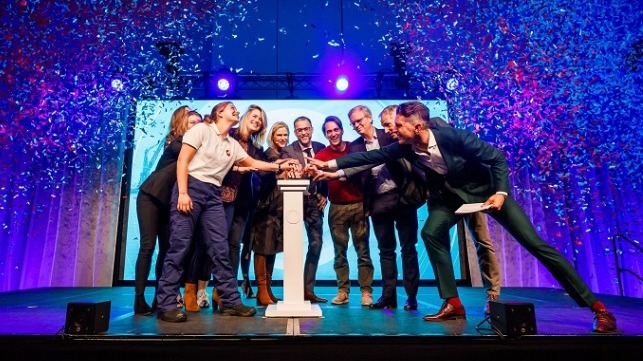Young Shipping Professionals Speak Up at Europort

At the opening summit of the Europort conference on Tuesday, members of the next generation of shipping professionals shared their insights on digitalization, energy transition and ship finance, along with their expectations of the maritime career.
The summit celebrated the 40th edition of Europort in newly expanded facilities at the Ahoy Center in Rotterdam. The leading maritime event successfully returned to an in-person experience months ahead of the nearest competition. Hosting almost 800 companies and organizations from 40 countries, Europort welcomes visitors from all over the world this week.
The value of this face-to-face engagement was clear in an exchange involving Young Maritime Representatives Maxime Abels, Juliette van Overbeek and Wessel Vollaard. Maritime Officer Studies graduate Vollaard disclosed that only 15 out of 100 of his fellow students had seen it through to graduation. In addition to those not making the grade, the high drop-out rate had to do with misperceptions of what working at sea is like, he said.
“To me, this career is the total package, offering participants a high-tech industry, early responsibility, a highly sociable environment and travel. The other side of it is that, for some, six months at sea can be hard to handle," he said.
Low carbon shipping
Representatives from the Technical University in Delft told the summit audience about an industry-sponsored prototype boat that uses a hydrogen fuel cell for propulsion and will offer new insights on the zero-emission technology for commercial shipping.
“Our mission is to demonstrate what's possible and to try to inspire others on what can be achieved, starting with maritime industry,” said Sophie van 't Hoff, team manager for TU Delft's Solar Boat Team. “We have to take action [on the environment] now so we have to start implementing these new technologies.”
Anna Koper, who has been working on the project over the last year, expressed ambitions that the technology could be converted from a prototype to a commercial solution for a container ship by 2030.
Virtual ideas
Keynote speaker and internet entrepreneur Alexander Klöpping offered food for thought on a changing maritime industry, placing his focus on the impact of the fast-emerging virtual world. Klöpping, who made his name as the founder of online-news platform Blendle, envisaged cameras mounted on glasses quickly evolving, providing the basis for "you as avatar, as virtual person, to roam through virtual worlds."
Klöpping emphasized that those driving change today – Facebook, Google, Apple, etc. - are the same players that have been shaping the world for two decades.
While the idea of virtual art, virtual TVs and other virtual electronics did not thrill a logistics audience, 34-year-old Klöpping offered some respite by confiding plans to withhold all online tools from his young daughter until she could "prise them from my dead hands."
Green issues
For its finale, the summit brought together Annet Koster, the Director of Dutch shipowners' association KVNR; Yvan Vlamicnkx, Fast Lines' Managing Director; Adriaan Rüppell, Reederei Nord's Managing Director; and Nicholas Serritslev of YoungShip Rotterdam.
Serritslev portrayed an industry whose attractions could be lost on the young because of a lack of visibility and an image problem. “We need to take full responsibility for our actions; in the digital age it’s no longer possible to get away with things,” said the YoungShip Rotterdam spokesman. “As a younger person, I need to look to the people in charge today.” Shipping was also behind on digitalization, he said.
The older generation offered a few counter punches. Speakers described opportunities to be part of an innovative and challenging sector with an international outlook, open to digitalization and the development of lower carbon fuels, and attractive to financiers. With COP26 in mind, for example, Koster highlighted that shipping was pursuing hydrogen, biofuels and batteries as green propulsion alternatives.
The opinions expressed herein are the author's and not necessarily those of The Maritime Executive.

